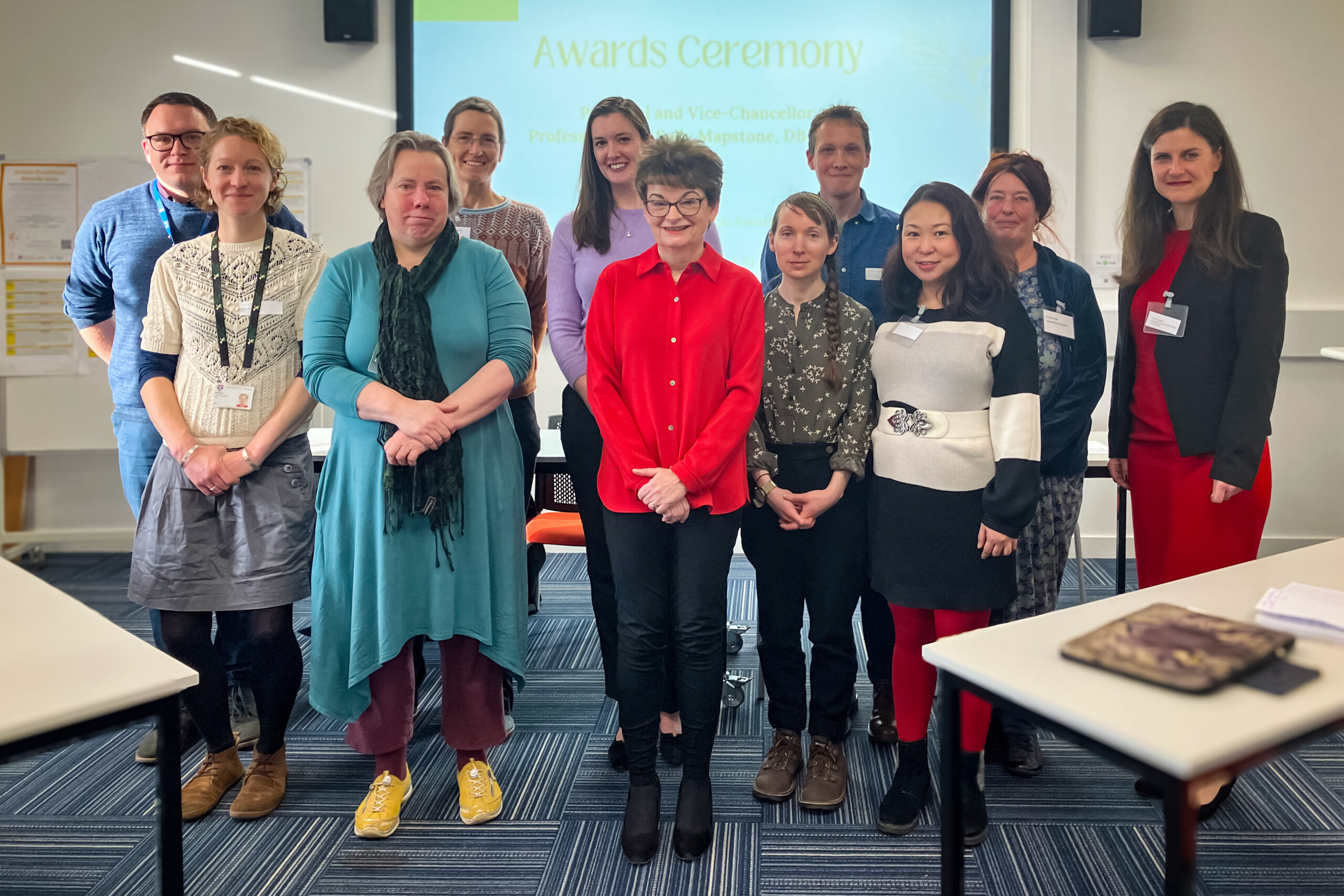Education for Sustainable Development Golden Dandelion Awards 2023

The 2023 Golden Dandelion Prize was awarded to Dr Charlotte Lee from the School of Geography and Sustainable Development for the module GG4253 Cultural geographies of climate activism, which creates connections between the personal and the political through encouraging student engagement with the climate crisis within the context of their everyday lives.
The Prize was presented by University of St Andrews Principal, Professor Dame Sally Mapstone FRSE, who has presented the Prize since its inception, at a Sustainability in the Curriculum (SitC) workshop held in Old Burgh School on Monday 27 November.
Now in its fourth year, the Golden Dandelion Awards are coordinated by the SiTC Committee, who invite submissions of curriculum modules that demonstrate considerable contribution to Education for Sustainable Development (ESD).
Speaking of the prize-winning module, Dr Gosia Mitka, Associate Dean (Education) Arts & Divinity and Chair of the SiTC Committee, stated: “The winning module was selected for its innovative and uplifting approach to teaching a topic which is often associated with fear and despair. It is a brilliant example of how education for sustainable development can leave students more empowered and motivated to tackle the challenges of our time.”
In addition to the Prize, modules in development are awarded Dandelion Awards in acknowledgment of their potential. This year, nine modules received Awards for reaching a quality standard for ESD.
Dr Lee, who received a Dandelion Award for the same module last year, said: “I found this really encouraging. I’m an early career researcher and this is the first module I’ve designed myself – to receive this kind of positive recognition so early on was a real boost to my confidence.”
The module was developed through Dr Lee’s research interests as a cultural geographer and climate activist and was inspired by a chapter she contributed to the Critical Geographies of Resistance, edited by Sarah Hughes and published this year.
“Given that many students in our current cohorts have encountered or been involved in the School climate strikes, I felt that there was a need for a module which focused specifically on activism,” Dr Lee notes. “I reflect on the way we often associate activism with protest and more visible forms of action and undervalue other forms of activism. While the School strikes are less prominent now, I think that makes it even more important to give students a space to develop or reinvigorate their interest in climate activism.”
Students who have taken the module have gone on to pursue activism-related research, and others speak to how the work encouraged them to reconsider their assumptions around activism.
“I feel as though I’m leaving this module more knowledgeable on activist practices, and also what can be thought of as activism,” one student noted.
Entries for the 2023 Prize were drawn from across the University including the Schools of Business, Chemistry, Classics and Music, among others, demonstrating the breadth of engagement with ESD at St Andrews. The award ceremony was combined with a Sustainability in the Curriculum workshop, facilitated by the SiTC Committee. Attendees included students and staff and offered an opportunity for celebration and learning.
Flore Bindel, second year student in Economics and Sustainability, said she found it reassuring to see so many subject modules aligning with sustainability education.
“Ultimately this means that subjects that tend to have difficulty aligning with sustainable development (such as Economics) will have to take on new perspectives,” she said. “Discussions will arise, and revolutionary ideas will be thought of as a community. This is a fascinating improvement that will positively impact the University for years to come, and will lead to greater awareness by all students, not only those studying SD and Geography.”
“All academics and disciplines have a role to play in sustainability,” says Dr Mitka.
“Education for Sustainable Development is about developing the competencies in our students to consider the future and how to pursue better outcomes by learning from the past, thinking critically about the present, and working with others.”
University commitment to ESD includes a slate of Virtually Integrated Projects (VIPs) which give students from any discipline the opportunity to engage in sustainability research, as well as Masters and Bachelor degrees in sustainable development. Postgraduate research opportunities and taught degrees are also available in sustainable development.
In addition to the Golden Dandelion Awards, the SiTC Committee work with School sustainability representatives and offer training, workshops and fora addressing sustainability the throughout the year.
If you are interested in finding out how to get involved with Sustainability teaching and learning at St Andrews, and perhaps prepare a submission for the 2024 Golden Dandelion Awards, visit the Sustainability in the Curriculum website.
Issued by the University of St Andrews Communications Office.